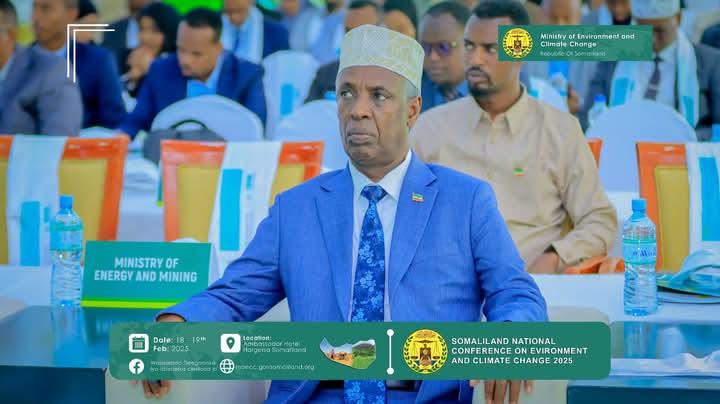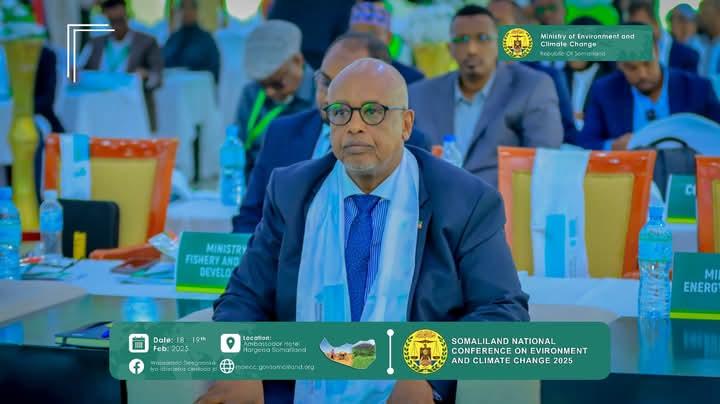By: Mohamed Duale, Horndiplomat Chief Editor
Hargeisa, Somaliland – The Vice President of the Republic of Somaliland, Mohamed Ali AwAbdi, officially inaugurated the Somaliland National Conference on Environment and Climate Change 2025 at the Ambassador Hotel on Tuesday. The conference, organized by the Ministry of Environment and Climate Change, focused on addressing climate challenges, promoting sustainable agriculture, enhancing energy efficiency, and fostering afforestation efforts across the country.
During his opening speech, Somaliland Vice President Mohamed Ali aw Abdi emphasized the significance of climate action, highlighting its impact on both rural and urban communities.
“Climate change is a relatively new concept, and if we don’t act, it will impact everyone’s life, especially in this country. I am very pleased that this ministry is working on and organizing this important meeting. I hope that this conference fulfills all its intended aims and has a positive impact in both rural and urban areas.”
The Somaliland Minister of Environment and Climate Change, Cabdilaahi Jama Ismail Geeljire, underscored the purpose of the gathering, stating:
“The importance of this conference is to raise awareness and understanding of the environment and climate change among the people of Somaliland.”

The conference successfully brought together policymakers, environmental experts, community leaders, and international organizations to discuss strategies for climate resilience and sustainable development. Key discussions centered on sustainable agricultural practices, environmental conservation, and policy recommendations to mitigate the adverse effects of climate change.
Conclusion of the Conference:
The two-day event concluded on Wednesday with a series of resolutions and actionable steps to combat climate change in Somaliland. Minister Abdilahi Jama Ismail Geeljire delivered the closing remarks, which outlined the following key resolutions:
-
Policy Implementation and Climate Action Plans
The conference emphasized the urgent need for the implementation of policies, regulations, and adaptation plans related to climate change, aligned with Somaliland’s National Development Plan 3 (NDP 3). -
Collaboration with the Private Sector
Recognizing the role of both government and private sector, the conference called for joint initiatives focused on renewable energy, liquefied purified gas, and energy-efficient technologies to reduce reliance on fossil fuels. -
Environmental Impact Study
The conference proposed conducting a study to assess the environmental impacts of climate change to better understand the challenges and inform future policy decisions. -
National Biodiversity Strategy
The development of a National Biodiversity Strategy was highlighted as a critical step in conserving biological diversity and protecting ecosystems from the threats posed by climate change. -
Strengthening International Partnerships
Strengthening partnerships with international organizations focused on climate change adaptation was deemed vital. These collaborations will promote the adoption of green technologies, eco-friendly infrastructure, and innovative climate resilience solutions. -
Marine Protected Areas
In line with efforts to protect marine ecosystems, the conference proposed the establishment of marine protected areas. -
Community Capacity Building
The conference suggested implementing capacity-building programs for civil society organizations, as well as promoting knowledge-sharing to enhance local communities’ ability to mitigate and adapt to climate change. -
Tree Planting Initiative
A major resolution was the call to plant 1 million trees by the end of 2025, in collaboration with local governments and agencies, to combat deforestation and mitigate the effects of climate change. -
Early Warning Systems and Disaster Preparedness
Developing early warning systems for forecasting and communicating climate change impacts and natural disasters was recommended as essential for disaster preparedness and resilience. -
Environmental Protection Fund and Unit
The creation of an environmental protection and climate impact mitigation fund, along with the deployment of a specialized environmental protection unit within the police force, was proposed to safeguard the environment and enhance conservation efforts. -
Tax Incentives for Green Technologies
To promote the use of environmentally friendly technologies, the conference recommended offering tax exemptions on cooking gas and energy-efficient equipment. -
Sustainability Committee
To ensure long-term environmental sustainability, the conference proposed forming a committee to oversee the continued development of environmental initiatives.




![Analysis: Somalia’s Taiwan Passport Ban and Its Diplomatic and Legal Implications The ban on Taiwanese passport holders starts on April 30, 2025 [File: Ann Wang/Reuters]](https://www.horndiplomat.com/wp-content/uploads/2025/05/2020-04-03T000000Z_547677312_RC2VWF9IBNAH_RTRMADP_3_HEALTH-CORONAVIRUS-TAIWAN-CHINA-1746001994-218x150.webp)



